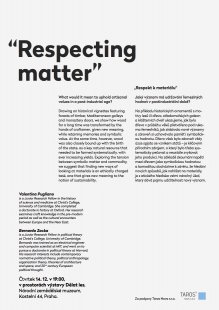
Valentina Pugliano & Bernardo Zacka : Respecting matter
Zdroj
Národní zemědělské muzeum, Praha
Národní zemědělské muzeum, Praha
Vložil
Tisková zpráva
11.12.2017 20:55
Tisková zpráva
11.12.2017 20:55
Praha
Letná
mjölk architekti
Konání přednášky: čtvrtek 14.prosince 2017 v 19:00 hodin v prostorách výstavy Dělat les, Národní zemědělské muzeum, Kostelní 44, Praha.
Parner přednášky: Taros Nova s.r.o.
Přednášející:
Valentina Pugliano is a Junior Research Fellow in the history of science and medicine at Christ’s College, University of Cambridge.
Bernardo Zacka is a Junior Research Fellow in political theory at Christ’s College, University of Cambridge. Bernardo was trained as an electrical engineer and computer scientist at MIT, and went on to pursue a doctorate in political theory at Harvard. His research interests include contemporary normative political theory, political anthropology, organization theory, theories of architecture and space, and 20-th century European political thought.
Jaký význam má udržování řemeslných hodnot v postindustriální době?
Na příkladu historických ornamentů s motivy lesů či dřeva, středomořských galeon a klášterních dveří ukazujeme, jak bylo dřevo v průběhu věků přetvářeno pod rukama řemeslníků, jak získávalo nové významy a zároveň si uchovávalo paměť i symbolickou hodnotu. Dřevo však bylo zároveň vždy úzce spjato se vznikem států – je klíčovým přírodním zdrojem, o který bylo třeba systematicky pečovat a neustále zvyšovat jeho produkci. Na základě zkoumání napětí mezi dřevem jako symbolickou hodnotou a komoditou docházíme k závěru, že hledání nových způsobů, jak nahlížet na materiály, je z etického hlediska velmi náročný úkol, který dává pojmu udržitelnost nový význam.
What would it mean to uphold artisanal values in a post-industrial age?
Drawing on historical vignettes featuring forests of timber, Mediterranean galleys and monastery doors, we show how wood for a long time was transformed by the hands of craftsmen, given new meaning, while retaining memories and symbolic value. At the same time, however, wood was also closely bound up with the birth of the state, as a key natural resource that needed to be farmed systematically, with ever increasing yields. Exploring the tension between symbolic matter and commodity, we suggest that finding new ways of looking at materials is an ethically charged task, one that gives new meaning to the notion of sustainability.
Více informací >
Parner přednášky: Taros Nova s.r.o.
Přednášející:
Valentina Pugliano is a Junior Research Fellow in the history of science and medicine at Christ’s College, University of Cambridge.
Bernardo Zacka is a Junior Research Fellow in political theory at Christ’s College, University of Cambridge. Bernardo was trained as an electrical engineer and computer scientist at MIT, and went on to pursue a doctorate in political theory at Harvard. His research interests include contemporary normative political theory, political anthropology, organization theory, theories of architecture and space, and 20-th century European political thought.
Jaký význam má udržování řemeslných hodnot v postindustriální době?
Na příkladu historických ornamentů s motivy lesů či dřeva, středomořských galeon a klášterních dveří ukazujeme, jak bylo dřevo v průběhu věků přetvářeno pod rukama řemeslníků, jak získávalo nové významy a zároveň si uchovávalo paměť i symbolickou hodnotu. Dřevo však bylo zároveň vždy úzce spjato se vznikem států – je klíčovým přírodním zdrojem, o který bylo třeba systematicky pečovat a neustále zvyšovat jeho produkci. Na základě zkoumání napětí mezi dřevem jako symbolickou hodnotou a komoditou docházíme k závěru, že hledání nových způsobů, jak nahlížet na materiály, je z etického hlediska velmi náročný úkol, který dává pojmu udržitelnost nový význam.
What would it mean to uphold artisanal values in a post-industrial age?
Drawing on historical vignettes featuring forests of timber, Mediterranean galleys and monastery doors, we show how wood for a long time was transformed by the hands of craftsmen, given new meaning, while retaining memories and symbolic value. At the same time, however, wood was also closely bound up with the birth of the state, as a key natural resource that needed to be farmed systematically, with ever increasing yields. Exploring the tension between symbolic matter and commodity, we suggest that finding new ways of looking at materials is an ethically charged task, one that gives new meaning to the notion of sustainability.
Více informací >


0 komentářů
přidat komentář












